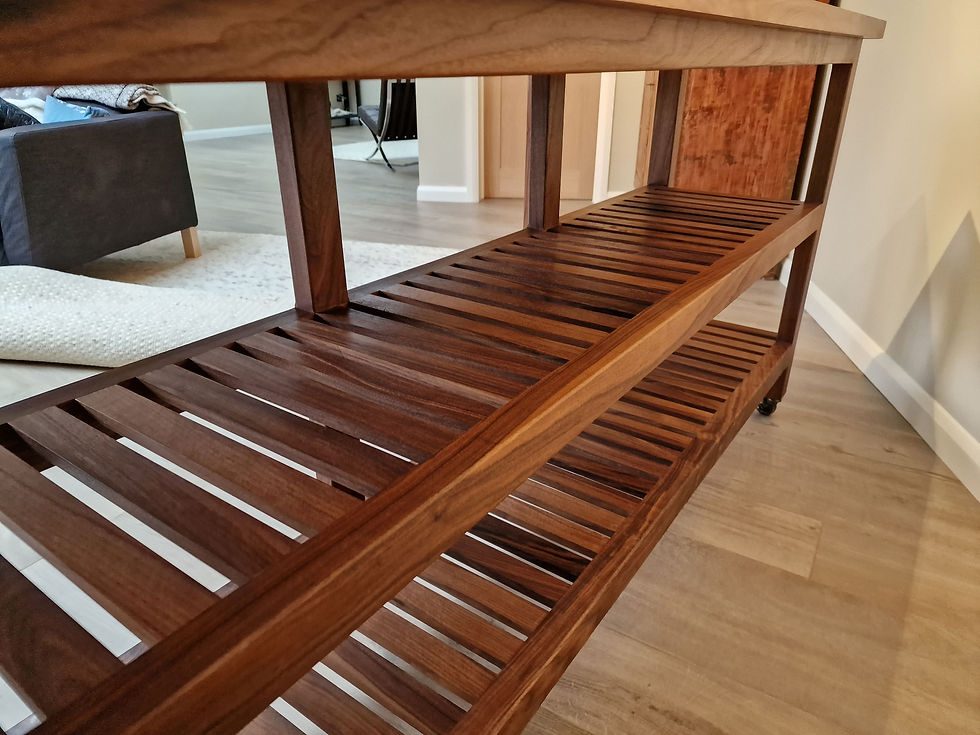How to Organise a Small Woodworking Workshop
- Rich Moss

- Dec 8, 2023
- 3 min read
Embracing the Craft in Compact Spaces
As a fine furniture designer and maker, I understand the challenges of turning limited space into a flourishing workshop. In this blog post, we'll delve into the intricacies of organising a small woodworking workshop, unlocking the potential to create beautiful bespoke furniture.
Maximising Space
The Power of Vertical Storage: In a compact workshop, vertical space is your greatest ally. Install sturdy shelves and pegboards on the walls to keep tools within arm's reach. Utilise the height of your workshop for storing timber, finishes, and other materials. This not only frees up valuable floor space but also adds an aesthetic touch to your workspace.
Modular Workstations for Flexibility: Consider building modular workstations that can be rearranged to accommodate different projects. This allows you to customise your space based on the size and scope of each furniture piece. Invest in mobile workbenches with storage underneath to keep tools organised and easily accessible.
Essential Tools: Quality Over Quantity

Curating a Core Toolkit: In a small workshop, the mantra is quality, not quantity. Focus on building a core toolkit of essential, versatile tools. A high-quality set of chisels, a reliable table saw, and a precision hand plane can go a long way. Invest in tools that serve multiple purposes to make the most of your limited space.
Compact and Portable Alternatives: Opt for compact and portable tools without compromising on functionality. Compact routers, cordless drills, and folding workbenches are excellent choices for a small woodworking setup. These tools not only save space but also provide the flexibility to work in various corners of your workshop.
Efficient Layout: Creativity and Functionality
The Flow of Work: From Raw Material to Furniture: Map out the workflow in your workshop to ensure a seamless transition from one stage of the process to another. Place raw materials near the entrance for easy unloading, and arrange workstations in a logical order. This efficient layout minimises unnecessary movement.
Multi-Functional Zones: Divide your workshop into specialised zones, each catering to a specific aspect of the woodworking process. Create a cutting station, assembly area, and finishing corner. This zoning not only enhances organisation but also optimises your workflow, making every inch of your workshop purposeful.
Storage Solutions
Tackling the Lumber Dilemma: Managing lumber in a small space can be challenging. Invest in vertical lumber racks to keep your wood stash organised and easily accessible. Consider storing smaller offcuts in labelled bins, making it convenient to find the perfect piece for your next creation.
Drawer Divinity for Hardware: Small items like screws, nails, and hardware often find themselves scattered across the workshop. Embrace the magic of drawers with dividers to keep these essentials in order. Label each drawer for quick identification, saving you valuable time searching for the right-sized screw or the perfect hinge.
Lighting
Natural Light and Task Lighting Duo: Ample lighting is crucial for precision in woodworking. Maximise natural light by placing workstations near windows. Complement this with focused task lighting, ensuring that every detail of your project is illuminated. This combination not only enhances visibility but also creates an inviting and energetic workspace.
Flexible Lighting Fixtures: In a small workshop, flexibility is key. Opt for adjustable lighting fixtures that can be repositioned as needed. This adaptability allows you to illuminate specific areas during different stages of the woodworking process, from detailed carving to final finishing touches.
Safety First: Navigating Hazards in a Compact Haven
Clear Paths and Emergency Exits: Safety should always be a priority, especially in a confined space. Keep clear paths between workstations to avoid tripping hazards. Identify and mark emergency exits, ensuring a quick and safe escape route in case of unforeseen circumstances.
Dust Collection Systems for Clean Creativity: Woodworking generates dust that can be harmful when inhaled. Invest in a dust collection system to keep the air in your workshop clean and your lungs healthy. Compact, mobile units are available for smaller spaces, effectively capturing dust at the source and maintaining a pristine workspace.
Conclusion: The size of your workshop doesn't limit the grandeur of your vision. Embrace the challenge of organising a small woodworking haven, where every tool finds its place, and every piece of timber tells a story waiting to be crafted. By maximising space, curating a thoughtful toolkit, establishing an efficient layout, implementing smart storage solutions, illuminating your workspace, and prioritising safety, you'll transform your compact workshop into a fantastic creative space, that you'll enjoy being in.



